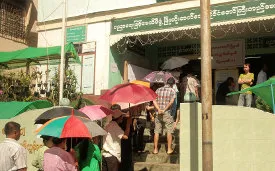Tumultuous year for Democracy in Asia & the Pacific

This year brought about a long-awaited general election in Myanmar, and a new constitution in Nepal, which was contested from the outset. Constitutional reforms were also initiated in Solomon Islands, Thailand, Philippines and Sri Lanka, moving forward at varying paces and intensity.
The Association of Southeast Asian Nations (ASEAN) is moving toward an ASEAN Community and issues of democracy and governance are featuring on the agenda more prominently throughout the region.
In addition the issue of money and politics was discussed at regional platforms, both in Indonesia and India. Guidelines on principles on how to tackle the campaign finance costs, transparency of expenditures and incomes, and the role of public funding are being considered. In the Pacific, growing concern over political instability is getting more attention from both national and regional actors.
Myanmar elections
As much anticipated in the light of the 2012 by-elections, the opposition party National League for Democracy and its leader Aung San Suu Kyi won nearly 80 per cent of the seats in the first genuine general elections in 25 years. In spite of the flawed legal framework and improvements to be made in the procedures, the 8 November elections were considered genuine by election observers and the results were accepted by winners and losers alike.
Transition of power from the current president and the cabinet will take place in March when parliament will elect a new president and cabinet. The challenges and opportunities ahead are linked with the anticipated constitutional reform which should tackle the issues of the role of military in politics, devolution of power, and fundamental rights among other issues.
Compromises and reconciliation are required so that transition to full-fledged democracy can move forward. For the time being the military retains 25 per cent of seats in parliaments at all levels and has a veto over constitutional amendments. Another challenge for the new government is the continued cease-fire negotiations with armed ethnic groups and advancing the political dialogue with these groups.
Nepal’s new constitution: A setback for inclusion and women’s rights
On 25 April and 12 May the country was struck by two major earthquakes. These devastating events provided a strong impetus to speed up the process of constitution drafting and on 21 September Nepal’s new constitution was promulgated.
The month preceding the promulgations was marred by violence and protests against the draft constitution, which have continued to date and left more than 50 people dead and many injured. The government has signalled its readiness to amend the constitution, however with no tangible outcomes yet.
For women’s movement and their supporters, the constitution was a disappointment. Women of Nepal still cannot convey their citizenship to their spouses, or to their children on equal basis with men. There are no constitutional quotas to include women into political decision making instead possible quotas are left to legislation.
Year 2016 will be critical in terms of reaching a sustainable agreement with the protesting and disaffected groups and getting the implementation started. Moving from a unitary state to a federal one will not be an easy task.
Constitutional reforms elsewhere in Asia
Thailand’s draft constitution was rejected by the military appointed parliament and general elections subsequently postponed until 2017. A new committee was appointed to start drafting from scratch, and a referendum on the new constitution is expected to take place in the latter half of 2016. Changes are anticipated especially on electoral system.
In Sri Lanka, constitution reforms regained momentum as the parliamentary elections confirmed victory for the political parties allied with the new president and his reform agenda. This includes changes in the electoral system, form of government, judiciary and devolution of power.
In the Philippines, the Bangsamoro peace process suffered a setback in January due to renewed fighting between Philippine police force and the Moro Islamic Liberation Front. Consequently, the planned hearing regarding the Bangsamoro Basic Law, which is the basis for establishing the new political entity in the Autonomous Region of Muslim Mindanao, was put on hold.
The existing autonomy arrangements are considered as failed by numerous evaluations and much hope is invested in the new law and new institutional arrangements that are to follow. The Bangsamoro process is significant also from the global point of view of reaching a political settlement in a conflict involving Christian and Muslim population.
Pacific
In the Pacific, the Pacific Island Forum leaders held its 46th meeting in Papua New Guinea where four items were presented under the new Framework for Pacific Regionalism. One of the items was the recognition of political aspirations of the people of West Papua for self-determination.
Political instability continued to mark politics in many parts of the Pacific. Most notably in Nauru and Vanuatu where the president dissolved parliament after 14 of its 52 members were convicted of bribery, leaving the small nation with an interim government but also providing chance for further reforms.
Toward ASEAN community
The 27th ASEAN summit in November launched an ASEAN Community to be formally established on 31 December. During the summit Member States also agreed on the ASEAN Community Vision 2025 which includes renewed commitment for people of ASEAN to “thrive in a just, democratic, harmonious and gender-sensitive environment in accordance with the principles of democracy, good governance and the rule of law”.
The vision also retained the initially controversial provision on best practices on “voluntary electoral observations and sharing such information among ASEAN member states on voluntary electoral observation by the ASEAN”.




